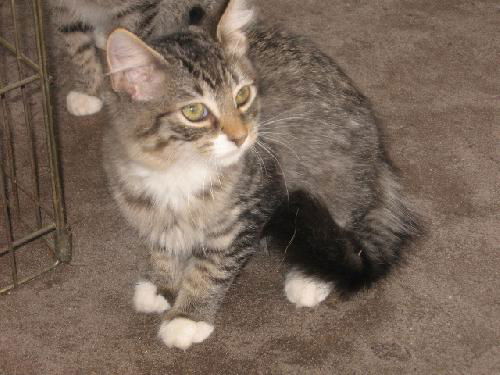Welcome to Pet Rescue By Judy!
401 South Laurel Avenue
Sanford, FL 32771
(407) 302-4497
info@petrescuebyjudy.com
Vancouver's Web Page

| My Rescue |
| Login to Remember your Favorite Animals and Breeds! |
Vancouver needs a caretaker or foster!
Won't you consider helping her get a new start?
Won't you consider helping her get a new start?
Name: Vancouver
Status: Adopted!
Adoption Fee: $150
Species: Cat
Breed: Domestic Medium Hair
Color: Gray Tabby
Sex: Female
Current Size: 3 Pounds
Potential Size: 8 Pounds
General Potential Size: Medium
Current Age: 16 Years 2 Months (best estimate)
Activity Level: Highly Active
Indoor or Outdoor: Indoor Only
Good with Dogs: Yes
Good with Cats: Yes
Good with Kids: Yes
Declawed: No
Housetrained: Yes
Microchipped: Yes
Vancouver's mother, Montreal the Outgoing Tabby (adopted) can also be seen on our website.
Vancouver must be adopted with her brother, Toronto (adopted).
Vancouver must be adopted with her brother, Toronto (adopted).
Description:
Poor Vancouver and Toronto were found in an abandoned apartment with their mom. How horrible! How could someone just abandon these beautiful cats?!
These kittens were TERRIFIED. One of our fantastic fosters took them home and has watched them slowly come out of their shells. Now they live to play (balls and feathers, please) and have become purr babies.
These two are very bonded, so we would prefer that they be adopted together. There will be a reduced fee for both of these little survivors!
Are these statements true or false? Cats always land on their feet. Cats should drink milk everyday. The correct answer to both is FALSE. According to the Cat Fanciers' Association, www.cfa.org, these are common misunderstandings that veterinarians frequently hear from pet owners, according to the American Animal Hospital Association (AAHA). Following is a list of popular myths that AAHA veterinarians and The Cat Fanciers' Association (CFA) would like to dispel. Myth: Cats always land on their feet. Fact: While cats instinctively fall feet first and may survive falls from high places, they also may receive broken bones in the process. Some kind of screening on balconies and windows can help protect pets from disastrous falls. Myth: Cats should drink milk everyday. Fact: Most cats like milk, but do not need it if properly nourished. Also, many will get diarrhea if they drink too much milk. If it is given at all, the amount should be small and infrequent. Myth: Cats that are spayed or neutered automatically gain weight. Fact: Like people, cats gain weight from eating too much, not exercising enough or both. In many cases, spaying or neutering is done at an age when the animal's metabolism already has slowed, and its need for food has decreased. If the cat continues to eat the same amount, it may gain weight. Cat owners can help their cats stay fit by providing exercise and not over-feeding. Myth: Cats cannot get rabies. Fact: Actually, most warm-blooded mammals, including cats, bats, skunks and ferrets, can carry rabies. Like dogs, cats should be vaccinated regularly according to local laws. Myth: Indoor cats cannot get diseases. Fact: Cats still are exposed to organisms that are carried through the air or brought in on a cat owner's shoes or clothing. Even the most housebound cat ventures outdoors at some time and can be exposed to diseases and worms through contact with other animals feces. Myth: Tapeworms come from bad food. Fact: Pets become infected with tape worms from swallowing fleas, which carry the parasite. Also, cats can get tapeworms from eating infected mice or other exposed animals. Myth: Putting garlic on a pet's food will get rid of worms. Fact: Garlic may make the animal's food taste better but has no effect on worms. The most effective way to treat worms is by medication prescribed by a veterinarian. Myth: Pregnant women should not own cats. Fact: Some cats can be infected with a disease called toxoplasmosis, which occasionally can be spread to humans through cat litter boxes and cause serious problems in unborn babies. However, these problems can be controlled, if the expectant mother avoids contact with the litter box and assigns daily cleaning to a friend or other family member. Myth: A cat's sense of balance is in its whiskers. Fact: Cats use their whiskers as "feelers" but not to maintain their balance. Myth: Animals heal themselves by licking their wounds. Fact: Such licking actually can slow the healing process and further damage the wound.
These kittens were TERRIFIED. One of our fantastic fosters took them home and has watched them slowly come out of their shells. Now they live to play (balls and feathers, please) and have become purr babies.
These two are very bonded, so we would prefer that they be adopted together. There will be a reduced fee for both of these little survivors!
Are these statements true or false? Cats always land on their feet. Cats should drink milk everyday. The correct answer to both is FALSE. According to the Cat Fanciers' Association, www.cfa.org, these are common misunderstandings that veterinarians frequently hear from pet owners, according to the American Animal Hospital Association (AAHA). Following is a list of popular myths that AAHA veterinarians and The Cat Fanciers' Association (CFA) would like to dispel. Myth: Cats always land on their feet. Fact: While cats instinctively fall feet first and may survive falls from high places, they also may receive broken bones in the process. Some kind of screening on balconies and windows can help protect pets from disastrous falls. Myth: Cats should drink milk everyday. Fact: Most cats like milk, but do not need it if properly nourished. Also, many will get diarrhea if they drink too much milk. If it is given at all, the amount should be small and infrequent. Myth: Cats that are spayed or neutered automatically gain weight. Fact: Like people, cats gain weight from eating too much, not exercising enough or both. In many cases, spaying or neutering is done at an age when the animal's metabolism already has slowed, and its need for food has decreased. If the cat continues to eat the same amount, it may gain weight. Cat owners can help their cats stay fit by providing exercise and not over-feeding. Myth: Cats cannot get rabies. Fact: Actually, most warm-blooded mammals, including cats, bats, skunks and ferrets, can carry rabies. Like dogs, cats should be vaccinated regularly according to local laws. Myth: Indoor cats cannot get diseases. Fact: Cats still are exposed to organisms that are carried through the air or brought in on a cat owner's shoes or clothing. Even the most housebound cat ventures outdoors at some time and can be exposed to diseases and worms through contact with other animals feces. Myth: Tapeworms come from bad food. Fact: Pets become infected with tape worms from swallowing fleas, which carry the parasite. Also, cats can get tapeworms from eating infected mice or other exposed animals. Myth: Putting garlic on a pet's food will get rid of worms. Fact: Garlic may make the animal's food taste better but has no effect on worms. The most effective way to treat worms is by medication prescribed by a veterinarian. Myth: Pregnant women should not own cats. Fact: Some cats can be infected with a disease called toxoplasmosis, which occasionally can be spread to humans through cat litter boxes and cause serious problems in unborn babies. However, these problems can be controlled, if the expectant mother avoids contact with the litter box and assigns daily cleaning to a friend or other family member. Myth: A cat's sense of balance is in its whiskers. Fact: Cats use their whiskers as "feelers" but not to maintain their balance. Myth: Animals heal themselves by licking their wounds. Fact: Such licking actually can slow the healing process and further damage the wound.
Other Pictures of Vancouver (click to see larger version):
 47.4k |
 42.5k |
Copyright © Pet Rescue by Judy





